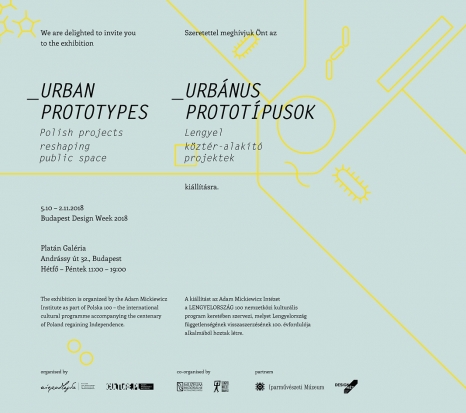Urban Prototyping: Polish Projects Transforming Public Space is an exhibition showcasing a selection of the most interesting small-scale projects designed for specific public spaces in Poland. In recent years, there has been a growing interest in urban space among both designers and design students. More and more minor design interventions can be best described as micro-improvements. Their primary goal is to enhance the usability of public spaces, improve their quality, and address specific problems identified by the designers themselves.
Public space has become one of the leading topics in design recently. The topics addressed by designers encompass both purely industrial projects (small architecture, urban furniture systems) and social projects targeted at specific groups within the city. Some of these initiatives are system solutions with the potential for citywide implementation, while others are dedicated to particular locations.
The works presented in the exhibition are authored by both experienced Polish designers and students from Polish design faculties. A very important aspect of these projects is their interdisciplinarity. When working with public spaces, knowledge from other fields outside of design proves essential. The projects showcased at the exhibition were developed in collaboration with technologists, physicists, sound engineers, ornithologists, and research units from Polish universities. These specific solutions presented at the exhibition make us aware that designers increasingly work in teams to respond to real needs in urban spaces.
The exhibition features projects dedicated to public spaces in Polish cities with various characteristics. Sometimes these are permanent projects, while others were created for festivals and are temporary and experimental in nature. Some projects have not yet been implemented, while others were conceptual projects developed at Polish universities. This wide spectrum within one of the fields of design illustrates how current and important the topic of public space design is in Poland.
However, what connects all the exhibits most is their response to specific needs in urban areas and the real improvement in the quality of public space through the aforementioned micro-improvements.
Accompanying the exhibition will be a specially prepared micro-installation titled “IN SITU” — a design for a garden bench for the Applied Arts Museum in Budapest, which will be realized in the Gyorgi Rath Villa garden, the temporary headquarters of the Museum. However, this is not a typical garden bench. Paweł Grobelny’s design balances between a functional object (the bench) and a sculpture or installation.
Organizer of the exhibition and installation: Adam Mickiewicz Institute
Curator of the exhibition and author of the installation: Paweł Grobelny
Co-organizers: Regional Museum in Stalowa Wola, Polish Institute in Budapest, Applied Arts Museum in Budapest
Coordinator: Ewelina Wiechnik, tel: 15 844 855 56 ext. 17, e-mail: ewiechnik@muzeum.stalowawola.pl
More information: www.culture.pl
This project is part of the international cultural program POLSKA 100, coordinated by the Adam Mickiewicz Institute, realized within the Multiannual Program NIEPODLEGŁA for the years 2017–2021. The POLSKA 100 program showcases the most significant achievements of Polish culture over the last hundred years, which continue to inspire creators and audiences around the world.
Financed by the Ministry of Culture and National Heritage within the Multiannual Program NIEPODLEGŁA for the years 2017–2021.
